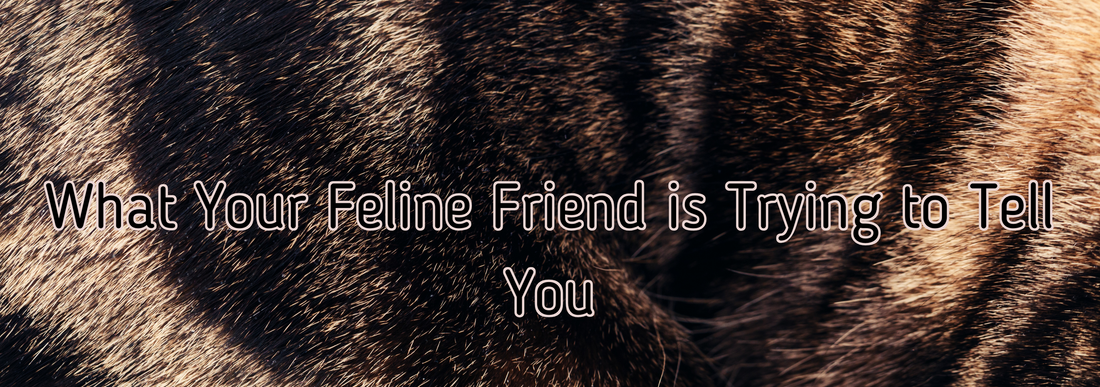
Decoding the Mystical Language of Cat Purrs: What Your Feline Friend is Trying to Tell You
Share
Decoding the Mystical Language of Cat Purrs: What Your Feline Friend is Trying to Tell You
🐾
Welcome to the enchanting world of cat communication, where the purr reigns supreme! Purrs are like the sweet whispers of the feline kingdom, a magical language that has captured the hearts of humans for centuries. But did you know that these mesmerizing vibrations can actually convey a variety of emotions and messages? Yes, you heard it right! Your furry companion isn’t just purring for the sake of it; each purr has its own unique story to tell. So, grab your favorite feline and let’s embark on this purr-filled journey to unravel the secrets behind the different types of purrs.
The Contentment Purr
Picture this: You’ve had a long day, and as you sink into your comfy chair, your cat jumps onto your lap, settling down into a warm, relaxed ball of fluff. Within seconds, the soothing hum of a purr fills the room. This is the classic contentment purr, the most commonly recognized and loved. It’s a gentle, steady vibration that resonates with a frequency of about 25 to 150 Hz, a sound that can melt the hardest of hearts. It’s your cat’s way of saying, “I’m happy, I’m safe, and everything is just purr-fect!” It’s like the feline version of a lullaby, signaling that all is well in their little cat world.
The Conversational Purr
Cats are social creatures, and they often use purrs to interact with us, their fellow furry friends, or even themselves. The conversational purr is usually a little louder and more varied in tone than the contentment purr. It’s like they’re holding a one-sided chat, waiting for you to respond. This purr can be a greeting, a request for food or attention, or even a gentle reminder that it’s time for a cuddle. If you listen closely, you might just find yourself purring back, engaging in the age-old dance of human-cat communication.
The Kitten Purr
Ah, the kitten purr! It’s like a soft, high-pitched squeaky toy that never stops being adorable. This type of purr is often heard in young cats as they nurse from their mother. It’s not just a sign of comfort; it’s also a way for kittens to let their mom know they’re okay and to encourage her to keep the milk coming. As your cat grows, this purr might come out during particularly cozy moments, reminding you of the sweet, innocent days of kittenhood. It’s like a little purr-filled time machine!
The Healing Purr
Ever noticed your cat purring more when you’re feeling under the weather? It’s not just your imagination. Cats have a special healing purr that vibrates at a frequency between 20 and 140 Hz, which is believed to help in their own self-healing and bone mending. This purr can also be a comforting gesture to you, their human companion, offering warmth and stress relief. Some say it’s their way of saying, “You’re going to be okay, I’ve got you covered with my purrs!”
The Pleading Purr
The pleading purr is the feline equivalent of a puppy dog eye. It’s a more intense, higher-pitched purr that’s often accompanied by a headbutt or two. This is your cat’s not-so-subtle way of saying, “I need something from you, and I need it now!” It could be a treat, a door opening, or maybe just a little more belly rub. Whatever it is, you’ll know it’s time to listen up and grant their furry wishes.
The Purr of Affection
This is the purr that makes you feel like the most important person in the world. It’s a deep, rumbling vibration that seems to come from the depths of their soul. It’s your cat’s way of expressing love and affection, often directed at you, their favorite human. It’s like a warm hug in purr form, telling you that you’re loved and appreciated.
The Purr of Excitement
Does your cat purr when they spot a bird outside the window or when it’s time for playtime? That’s the excitement purr! It’s usually a faster, more urgent purr that reflects their heightened state of arousal. This is your cue to grab a toy or get ready for some serious pouncing action.
The Purr of Fear or Anxiety
While purring is generally a positive sound, it can also be a sign of fear or anxiety. If you notice your cat purring during a vet visit or a thunderstorm, it’s their way of self-soothing. It’s like their own personal purr-therapy, providing comfort in a scary situation. Keep an eye on the context; if the purring is paired with other signs of stress, like dilated pupils or a tense body, it might be time to offer some extra TLC.
The Purr of Pain
It’s less common, but cats can sometimes purr when they’re in pain. It’s their instinctual way of self-soothing and asking for help without alarming others. If your cat is purring and seems unwell, it’s important to pay attention to other symptoms and consider a trip to the vet.
In conclusion, purrs are not just random noises that cats make; they are a complex form of communication that can convey a multitude of emotions and intentions. By tuning in to the subtle differences in pitch, rhythm, and volume, you can become a true cat whisperer, understanding the secret conversations your feline friend is trying to have with you. So next time you hear those enchanting vibrations, take a moment to appreciate the depth of their message and respond in kind with a gentle stroke or a comforting word. After all, purrs are the universal language of love in the cat world, and it’s up to us to listen and purr back!
